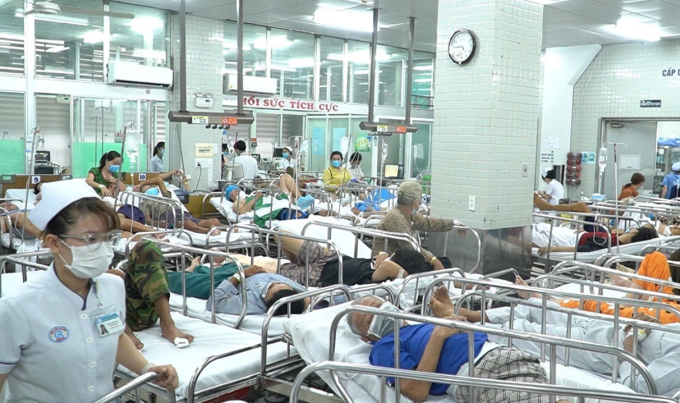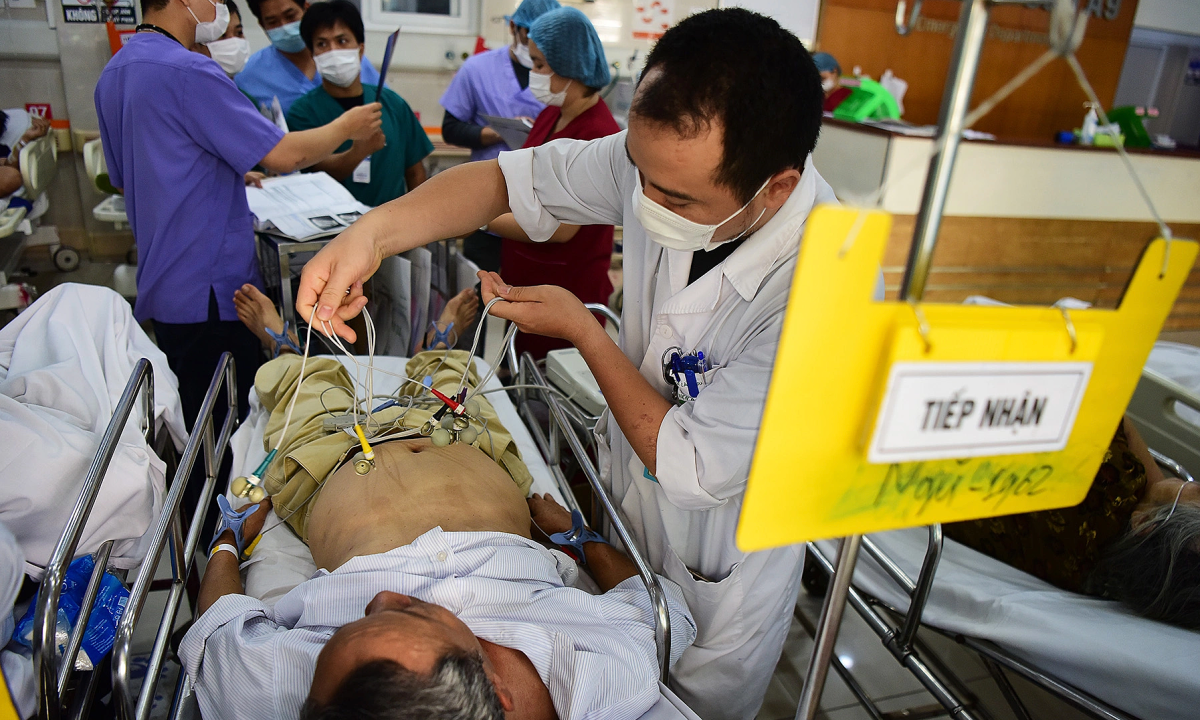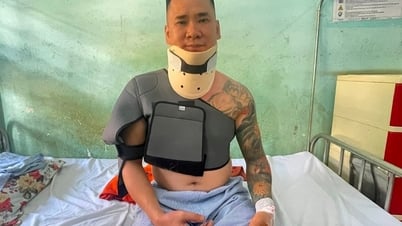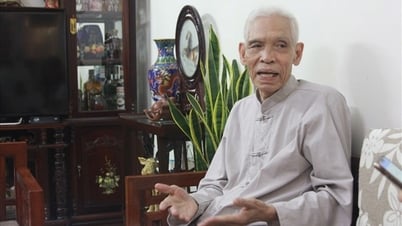The Emergency Department, Cho Ray Hospital is full of beds, afternoon of September 5, 2022
An 18-year-old man was in a traffic accident and was rushed to the hospital. While waiting for test results, his family rushed into the room and shouted, "Why is it taking so long? We have to wait for an emergency?"
The incident happened in early March, when a man took his younger brother to a tertiary hospital in Hanoi for emergency treatment. He had just collided with a car, fell and hit his head on the ground, his limbs were scratched, and he was bleeding profusely, but he was still conscious.
At the emergency room door, medical staff take information, do admission procedures, measure vital signs, hang up a classification board, and transfer to the patient's room.
After being ordered to have an X-ray, the patient continued to wait in the emergency room. At this time, the family urgently explained the critical condition, asking the doctor to come and check because they were "afraid of a traumatic brain injury". The family wondered: "Many patients who came later were taken care of first, why does my brother have to wait his turn?"
This scene is not uncommon in end-line hospitals. At Gia Dinh Hospital ( Ho Chi Minh City), a man stormed into the emergency room, repeatedly scolding and assaulting doctors and nurses for making their family members "wait for hours without being examined", demanding that someone be assigned to watch over and take care of the patient 24/7.
Meanwhile, according to the on-duty crew that day, the time from when this patient entered the hospital until the completion of giving medicine, blood tests, X-rays, applying a cast to immobilize the shoulder, and inviting an orthopedic specialist to examine him was only 24 minutes.
Recently, at Nam Dinh General Hospital, a family member rushed in and punched a male nurse in the face and neck. This person said that he did not see medical staff assisting his father whose health condition was deteriorating, so he lost his composure.
In medicine, saving lives is the ultimate command, and emergency care for patients is always a priority, even when they are not accompanied by relatives or their identity at the time of admission is unknown, according to Associate Professor, Dr. Nguyen Lan Hieu, Director of Hanoi Medical University Hospital.
Minister of Health Dao Hong Lan also emphasized that "saving people is the top priority, not for any reason". In the emergency department, every life is carefully considered.
According to the Law on Medical Examination and Treatment 2023 of the Ministry of Health, an emergency is a health condition or behavior that suddenly appears in a person and, if not monitored and intervened promptly, can lead to impaired body function, serious and long-term damage to organs, body parts or death of that person or seriously threaten the health and life of others.
However, "The process of receiving and treating emergency patients is classified according to severity, not waiting time, but many relatives still think that their loved ones are abandoned and neglected," said Dr. Ha Anh Duc, Director of the Department of Medical Examination and Treatment (Ministry of Health), adding that patients and their relatives want to be served quickly and thoroughly, while medical resources are limited.
"Expectations beyond the hospital's ability to meet are the root cause of conflicts," Mr. Duc acknowledged.
Mr. Pham Van Hoc, Chairman of the Board of Members and General Director of Hung Vuong Healthcare System, stated that the emergency environment always requires quick assessment and decision making with limited information. This is a challenge because each indication is vital.
However, the emergency department is inherently under a lot of pressure, such as time, the working space is often located right next to the hospital gate, often communicating with the outside, crowded with people, so it is easy to be messy, noisy and difficult to control.
"In order not to miss any patients, doctors are forced to classify and make quick and accurate decisions, otherwise they will 'lose their battle'," he said.
Dr. Tran Quang Thang, Head of the Emergency and Stroke Department, Central Geriatric Hospital, Hanoi, said that most people who go to the emergency room assume that they will "be treated immediately". Therefore, when they see their loved ones waiting, anxiety quickly turns into anger and suspicion, and many people blame and assault medical staff. In fact, emergency care does not mean "first come, first served". In the emergency department, the triage process is a vital principle, based on life and death risks and fairness in healthcare.
"Emergency triage is not about ignoring anyone, but about saving the most people, the right people, at the right time," the doctor said.
The Central Geriatric Hospital is the final line of treatment and health care for the elderly, continuously receiving serious cases. The emergency classification and treatment process is divided into 5 levels. Of which, the red level is immediate emergency treatment for life-threatening cases such as cardiac arrest, respiratory arrest, deep coma, convulsions, intravenous drug poisoning with impaired consciousness, dangerous behavioral disorders such as suicide, causing injury to others...
Yellow level is emergency treatment within 10 minutes in case of life-threatening risk or urgent treatment, severe pain. Specifically, patients with respiratory failure, circulatory failure, acute stroke, fever with lethargy, multiple trauma with severe blood loss, chest pain suspected to be due to cardiovascular disease, mental disorders...
The remaining three levels are respectively emergency within 30 minutes in cases that are potentially life-threatening or have adverse developments within 30 minutes; emergency within 60 minutes in cases that may have adverse developments if not treated within 60 minutes or require testing or hospitalization. The final level is emergency within 120 minutes in cases of mild or chronic illness, re-examination, review of old wounds, etc.
Doctors at the Emergency Center, Bach Mai Hospital give emergency treatment to a patient.
Bach Mai Hospital is the "front line", and the Emergency Resuscitation Center is the "hottest" place in the country. This place has more than 160 doctors, nurses, and medical staff, working in two shifts a day. On average, they receive more than 300 emergency cases a day, of which about 70% are critical patients. When a patient arrives, doctors classify them based on their condition and then prescribe appropriate treatment.
Specifically, the red list is the number one priority, requiring immediate resuscitation. These are patients with severe respiratory failure, impaired consciousness, circulatory arrest, and mental symptoms that pose a danger to themselves and others... The orange list is the second priority, requiring emergency treatment within 10 minutes. The yellow list is the third priority, requiring emergency treatment within 30 minutes, and the green list can be monitored and treated within 1 hour.
Viet Duc Hospital receives about 2,000 inpatients and about 2,000 outpatients, each patient usually has one or two family members accompanying them. The hospital has about 2,000 medical staff. Thus, every day there are about 10,000 people staying around the hospital. The unit builds emergency procedures and receives seriously ill patients in accordance with the regulations of the Ministry of Health.
In hospitals in Ho Chi Minh City, the time patients stay in the emergency department is usually no more than 4 - 6 hours, following the "4-hour rule" and "6-hour rule" stipulated by the city's Department of Health. Therefore, when initially handling, medical staff are forced to decide whether to transfer, discharge or transfer the patient to the appropriate inpatient department to avoid the situation of staying too long in the Emergency Department. The priority of intervention depends on the severity of the health condition.
Hospitals increase communication with patients' relatives during their stay in the emergency department, helping to create peace of mind and reduce unnecessary anxiety and frustration. In situations where the number of patients suddenly increases, such as mass poisoning, accidents, etc., hospitals will coordinate to increase emergency support staff.
According to the Law on Medical Examination and Treatment, it is the patient's right to receive emergency care and the responsibility of medical staff and doctors to ensure this right is fulfilled. However, doctors also have the right to refuse medical examination and treatment in certain cases.
For example, predicting a medical condition beyond one's ability or outside the scope of one's practice; medical examination and treatment contrary to the provisions of law or professional ethics; patients or relatives of patients committing acts that violate the body, health, or life of practitioners while performing their duties, except in cases where the person suffers from a mental illness or other illness that renders them unable to perceive or control their actions....
Associate Professor Nguyen Lan Hieu emphasized that the key issue is to build a quality emergency resuscitation system. Hospitals need to gradually perfect the process in accordance with their own conditions, and at the same time propose to establish a "loss compensation" mechanism for the emergency resuscitation department, so that these units do not have to balance their own revenue and expenditure, reduce financial pressure and maintain priority for treatment.
In addition, he emphasized that the emergency environment also needs to be protected from acts of violence. The implementation process must be based on the general standards of the Ministry of Health but flexibly adjusted according to the characteristics of each level, especially at district hospitals.
"Professionalism and transparency are the goals that the medical industry strives for. In the face of unscrupulous behavior, the medical community is ready to unite to protect justice," the doctor said.
TB (according to VnExpress)
Source: https://baohaiduong.vn/cap-cuu-cung-phai-cho-den-luot-411324.html




![[Photo] Many young people patiently lined up under the hot sun to receive a special supplement from Nhan Dan Newspaper.](https://vphoto.vietnam.vn/thumb/1200x675/vietnam/resource/IMAGE/2025/5/18/6f19d322f9364f0ebb6fbfe9377842d3)

![[Photo] Ready for the top competitions of Vietnamese table tennis](https://vphoto.vietnam.vn/thumb/1200x675/vietnam/resource/IMAGE/2025/5/18/9c547c497c5a4ade8f98c8e7d44f5a41)


![[Photo] Party and State leaders attend the special art program "You are Ho Chi Minh"](https://vphoto.vietnam.vn/thumb/1200x675/vietnam/resource/IMAGE/2025/5/18/6895913f94fd4c51aa4564ab14c3f250)















































































Comment (0)